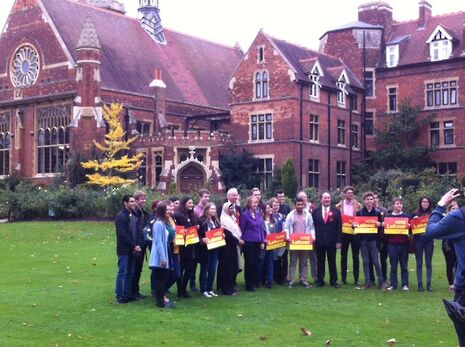Harriet Harman at Homerton
Today Harriet Harman appeared at Homerton College in order to lend her support to Labour by-election candidate Rahima Ahammed

The Shadow Deputy Prime Minister of the Labour party spoke to assembled students from the Cambridge University Labour Club (CULC), telling them that “the hand of history is on your shoulders”.
She emphasised the importance of CULC students in terms of campaigning for Ahammed in the local Queen Edith district by-election, which will take place on the 13th of November.
Homerton is the only college within the district in which the by-election is being held, after its Labour council representative was forced to step down due to family issues.
Harman encouraged students that a successful win for Ahammed would allow them to “sweep on” to support the Labour candidate for parliament, Daniel Zeichner, in his attempt to regain the seat from current Liberal Democrat MP Julian Huppert.
Harman is also the Shadow Secretary of State for Culture, Media and Sport, and spoke about her and her party’s hopes for the general election next year. She described the Conservatives as a government that “richly deserves to be gotten rid of”.
She also emphasised that the Leader of the Labour party, Ed Milliband, was deeply concerned about the rising cost of living in the UK and pressures on the NHS. Harman described Labour as “absolutely determined” to bring these issues to the forefront of the election run-up.
The Deputy leader of the Labour party did briefly have time to talk to Varsity about her experiences in the House of Commons and in British politics generally.
Harman noted the importance of the youth vote, particularly in Queen Edith’s ward but also on the national scale, stating that “it is very important for young people to vote, but also for young people to become engaged in the Labour Party.”
Harman mentioned that Labour currently has more young members than all other parties put together, however that youth participation still needs to rise. The much higher proportion of old voters in the UK skews politics, according to Harman and thus the voice of young people needs to emerge as an important factor in shaping policy.
When asked about the effectiveness of all-women shortlists, the Labour politician stated that they are not popular tools to bolster female representation in the House of Commons, but that shortlists do achieve their objectives. Citing her experience with previous experiments to get women more involved in politics Harman came to the conclusion that “shortlists are not the best way, they are the only way.”
In the eyes of the Shadow Deputy PM politics is about being representative and so the House of Commons needs to evolve into an institution with members from different backgrounds, age groups and regions of the UK.
Particularly the introduction of more women into politics can, according to Harman, bring significant changes to the agendas of the British political landscape. Harman used the example of domestic violence, which only really emerged as a political talking-point after female representation in Parliament rose.
Harman left Homerton with a simple three-word message for any aspiring female politicians: “We need you.”
 Interviews / ‘People just walk away’: the sense of exclusion felt by foundation year students19 April 2024
Interviews / ‘People just walk away’: the sense of exclusion felt by foundation year students19 April 2024 News / Copycat don caught again19 April 2024
News / Copycat don caught again19 April 2024 News / AMES Faculty accused of ‘toxicity’ as dropout and transfer rates remain high 19 April 2024
News / AMES Faculty accused of ‘toxicity’ as dropout and transfer rates remain high 19 April 2024 Theatre / The closest Cambridge comes to a Drama degree 19 April 2024
Theatre / The closest Cambridge comes to a Drama degree 19 April 2024 News / Acting vice-chancellor paid £234,000 for nine month stint19 April 2024
News / Acting vice-chancellor paid £234,000 for nine month stint19 April 2024




